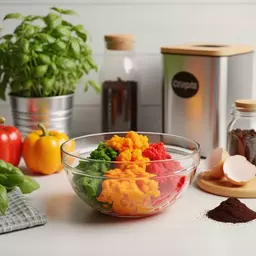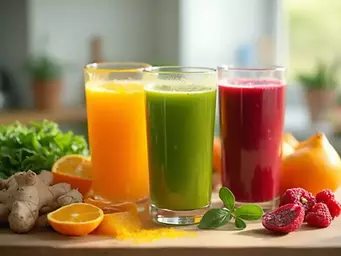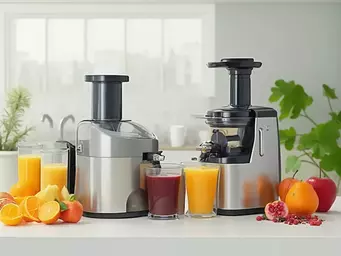What if your daily juice could not only boost your health but also contribute to a healthier planet? Embracing eco-friendly juicing is a choice that reflects your commitment to sustainability while savoring every sip.
What You Will Learn
- Eco-friendly juicers use safer materials like BPA-free plastics and stainless steel, promoting health and sustainability.
- Energy-efficient models reduce electricity consumption, leading to lower bills and a smaller carbon footprint.
- Key eco-friendly certifications to look for include Energy Star, Green Seal, and the EU Eco-Label, ensuring your appliance meets environmental standards.
- Choosing sustainable juicing practices can enhance nutrient retention in your juices, leading to better health benefits.
- Investing in high-quality, durable juicers minimizes waste and the need for frequent replacements, aligning with sustainable living goals.
The Pillars of Eco-Friendly Juicing
Discover the key elements that define an eco-friendly juicer and contribute to a sustainable lifestyle.
Material Selection
BPA-free plastics & stainless steel ensure safety and minimize environmental impact.
Energy Efficiency
Lower electricity consumption means reduced bills and a smaller carbon footprint.
Durability
Built to last with high-quality materials, reducing waste and the need for replacements.
Eco-Certifications
Look for Energy Star, Green Seal, or EU Eco-Label for verified sustainability.
Understanding Eco-Friendly Juicers: A Sustainable Choice
Welcome to the world of eco-friendly juicing! At The Juicing Hub, we believe that making sustainable choices in the kitchen can have a big impact on our health and the environment. Choosing an eco-friendly juicer isn’t just about the appliance itself; it’s about embracing a lifestyle that values both wellness and sustainability. So, let’s dive into what makes a juicer eco-friendly!
What Makes a Juicer Eco-Friendly?
An eco-friendly juicer is designed with sustainability in mind. Here are some key features that set these juicers apart:
- Material Selection: Eco-friendly juicers often use BPA-free plastics and stainless steel, which are safer for both our health and the planet.
- Energy Efficiency: These juicers consume less electricity compared to traditional models, making them better for your energy bill and the environment!
- Durability: High-quality materials mean that an eco-friendly juicer is built to last, reducing the need for replacements and minimizing waste.
By choosing a model that incorporates these elements, you're not just investing in a juicer but also in a healthier planet. Have you considered how the materials of your kitchen appliances affect the environment?
The Importance of Energy Efficiency in Juicing Appliances
When it comes to juicing, energy efficiency is crucial. Using an energy-efficient juicer can cut down on your electricity consumption significantly. Here’s why it matters:
- Lower Energy Bills: More efficient juicers use less power, which translates to savings on your monthly utility bills.
- Reduced Carbon Footprint: Using less energy contributes to a decrease in greenhouse gas emissions, which is vital for our planet's health.
- Better Performance: Many energy-efficient juicers are designed to extract maximum nutrients while using minimal energy, ensuring you get the most from your fruits and vegetables!
At The Juicing Hub, we always emphasize the importance of making choices that benefit both your wellness journey and the environment. What features do you look for in a juicer to help reduce your carbon footprint?
Eco-Friendly Certifications: What to Look For
When shopping for a juicer, it's essential to pay attention to eco-friendly certifications. For example, the U.S. Environmental Protection Agency (EPA) offers valuable guidance on sustainable product choices. Here’s what to look for:
- Energy Star Certification: This indicates the appliance meets high energy efficiency standards set by the U.S. Environmental Protection Agency.
- Green Seal: This certification ensures the product has been tested for environmental safety and performance.
- EU Eco-Label: A mark for products containing a reduced environmental impact throughout their lifecycle.
These certifications can help guide you toward making informed choices. By selecting certified eco-friendly products, you’re ensuring that your juicing habits align with your sustainability goals. Have you checked the certifications on your current appliances?
Exploring the Top Eco-Friendly Juicers for 2025
As we look ahead, it’s exciting to discover innovative eco-friendly juicers that are making waves in the market! Let’s explore some standout features that define the best options available.
Pro Tip
Did you know? Incorporating a variety of fruits and vegetables in your juicing routine not only enhances the flavor but also maximizes the nutritional benefits. Experiment with combinations like kale and apple or beetroot and ginger to discover your perfect blend!
Frequently Asked Questions About Eco-Friendly Juicing
Here are some common questions about choosing and using eco-friendly juicers:
- What materials should I look for in an eco-friendly juicer?
- You should prioritize juicers made with BPA-free plastics and stainless steel, as these materials are safer for your health and have a lower environmental impact.
- How does an energy-efficient juicer benefit me?
- An energy-efficient juicer reduces your electricity consumption, leading to lower monthly utility bills and a smaller carbon footprint, which is good for the planet.
- What certifications indicate a juicer is eco-friendly?
- Look for certifications like Energy Star, Green Seal, and the EU Eco-Label. These certifications confirm that the appliance meets specific environmental and energy efficiency standards.
- How does sustainable juicing impact the nutritional value of my juice?
- Sustainable juicing practices, often found in eco-friendly juicers, can help preserve more nutrients in your juice, ensuring you get maximum health benefits from your fruits and vegetables.
- Why is durability important for an eco-friendly juicer?
- Durable juicers, built with high-quality materials, last longer, reducing the need for frequent replacements. This minimizes waste and aligns with a sustainable lifestyle.
Summarizing the Benefits of Eco-Friendly Juicers
Choosing an eco-friendly juicer is not just a decision about the appliance itself; it's a choice that resonates with your values and lifestyle. At The Juicing Hub, we believe that sustainable juicing practices make a significant impact on both our health and the environment. By opting for eco-friendly juicers, you’re investing in a brighter, greener future!
But why should you choose sustainable juicing? First and foremost, it reduces waste and encourages the use of renewable materials. Additionally, eco-friendly juicers often operate with better energy efficiency, which means lower electricity bills and a smaller carbon footprint. It’s a win-win for your health and the planet! For more insights into reducing waste, consider resources from organizations like the Natural Resources Defense Council (NRDC) on food waste and sustainability.
Why Choose Sustainable Juicing?
Embracing sustainable juicing can transform your daily routine in multiple ways. Here are some compelling reasons to consider:
- Environmental Impact: Eco-friendly juicers help reduce waste and promote responsible sourcing of materials.
- Healthier Choices: These appliances often preserve more nutrients, giving you maximum benefits from your fruits and veggies.
- Cost-Effectiveness: Energy-efficient models save money on electricity and often require fewer repairs over time.
- Quality of Juice: You’re likely to enjoy fresher, richer juices that are packed with flavor and nutrition.
By making the shift to sustainable juicing, you’re not just taking a stand for your health; you’re also contributing to a healthier planet. It's a simple yet powerful decision!
Health Benefits of Juicing: A Plant-Based Perspective
Juicing isn't only about what goes into your glass; it’s about what you gain from it. Fresh juices can provide a plethora of health benefits, especially when made with eco-friendly juicers. Research, such as that published in ScienceDirect on the environmental impact of food, highlights the broader benefits of plant-based diets. Here’s how:
- Boosts Nutrient Intake: Juicing extracts essential vitamins and minerals from fruits and vegetables that might otherwise go uneaten.
- Detoxification: Plant-based juices can help cleanse your system, promoting better digestion and detoxification.
- Enhanced Hydration: Fresh juices are hydrating and can replace sugary drinks, supporting overall wellness.
- Supports Immune Function: Ingredients like citrus and greens are rich in antioxidants, bolstering your immune system.
Incorporating more fresh juice into your diet can be a delicious way to improve your overall health and well-being. Have you tried any plant-based juice recipes lately? I’d love to hear about your favorites!
Final Thoughts on Energy-Efficient Appliances for Juicing
As we wrap up our discussion on eco-friendly juicers, remember that the choice you make has lasting effects! Energy-efficient appliances not only contribute to a healthier lifestyle but also reflect a commitment to sustainability. Each time you juice, you make a conscious choice that resonates beyond your kitchen.
Consider exploring various models and brands to find the perfect eco-friendly juicer that fits your needs. At The Juicing Hub, we’re here to help you every step of the way with tips, recipes, and product reviews that enhance your juicing experience!
Encouraging Sustainable Practices in Your Lifestyle
Call to Action: Make Your Juicing Choices Count
Now is the time to take action! Evaluate your current juicing habits and think about how you can incorporate more sustainable practices into your routine. Whether it's selecting eco-friendly juicers or reducing waste, small changes can lead to significant impacts!
Join our community at The Juicing Hub and share your juicing journey with us. We’re eager to hear your stories and support one another in making healthier, more sustainable choices every day!
Further Resources for Sustainable Living and Juicing
To aid in your journey toward sustainability, check out these valuable resources:
- Books on sustainable living and juicing best practices
- Online courses focused on eco-friendly cooking techniques
- Websites and blogs dedicated to plant-based nutrition
- Community groups focused on health and environmental activism
By leveraging these resources, you can enhance your knowledge and find inspiration to make lasting changes in your lifestyle.
Exploring Juicing Trends: From Juice Cleanses to Raw Juicing
Finally, let’s look at some exciting juicing trends! The world of juicing is constantly evolving, with new ideas and practices emerging regularly. Here are a few trends to keep an eye on:
- Juice Cleanses: Many people are embracing short-term juice cleanses to reset their systems.
- Raw Juicing: This trend focuses on using raw, fresh ingredients to maximize nutrient retention.
- Functional Juices: Blends that target specific health goals, such as energy boosts or improved digestion, are gaining popularity.
Are you curious about trying any of these trends? I'd love to hear what piques your interest and if you’ve had any experiences with them!
Recap of Key Points
Here is a quick recap of the important points discussed in the article:
- Material Selection: Choose juicers made with BPA-free plastics and stainless steel for safety and sustainability.
- Energy Efficiency: Opt for energy-efficient models to lower energy bills and reduce your carbon footprint.
- Durability: Invest in high-quality juicers that are built to last, minimizing waste and the need for replacements.
- Eco-Friendly Certifications: Look for certifications like Energy Star, Green Seal, and EU Eco-Label when selecting a juicer.
- Health Benefits: Fresh juices made with eco-friendly juicers boost nutrient intake and support overall wellness.
- Sustainable Practices: Incorporate sustainable habits like reusing pulp to make the most of your juicing experience.






